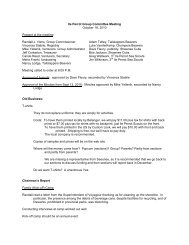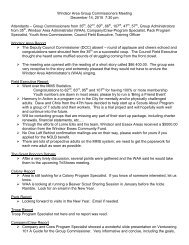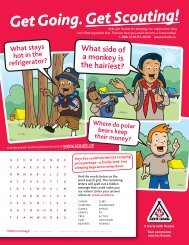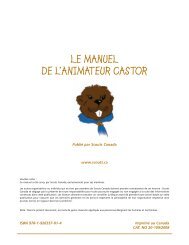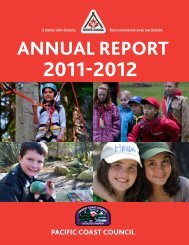Beaver Leader's Handbook - Scouts Canada
Beaver Leader's Handbook - Scouts Canada
Beaver Leader's Handbook - Scouts Canada
You also want an ePaper? Increase the reach of your titles
YUMPU automatically turns print PDFs into web optimized ePapers that Google loves.
Try not to ask questions. Do not suggest interpretations or solutions that might cause problems in a<br />
court case. You do need to establish the immediacy of the danger to the child; you must not allow the<br />
child to return to a situation where his or her life would be in immediate danger. It would be best if<br />
you remained close by to provide comfort.<br />
What if the Child Asks You Not to Tell Anyone Else?<br />
Being an emphatic listener does not mean that you can abandon your own beliefs or that you can<br />
ignore your responsibilities. Children who tell you about abuse sometimes ask that you keep the information<br />
a secret. The first thing to do is to explore why the child wants to keep the information a secret.<br />
You may unlock fears about others in the family being hurt or even feelings of guilt. You need to let<br />
the child know that you understand why you are being asked not to tell. However, you must be honest<br />
with the child about your duties and responsibilities. You can be reassuring in offering to stay near<br />
by or in telling the child that the people who will pick up the investigation know about children and<br />
want to help. But you must let the child know what to expect from you and what should happen next.<br />
Don’t make promises you cannot keep.<br />
Remember, as an empathic listener you lend yourself for awhile to another to try to see the world as<br />
the other sees it, but the you must always return to your own frame of reference. It is when you return<br />
to your own perspective that you are able to turn the new understanding you have gained into helpful<br />
action. It is expected that, as a youth leader, you have the knowledge and strength to assure that<br />
an abused child gets needed help.<br />
4. Write Down The Facts<br />
Record the child’s name, address and telephone number. The date and place of your conversation with<br />
the child are important. Details of what the child has reported should be recorded using the actual<br />
words that the child used. Do not try to interpret what the child said in your own words; if you do,<br />
make it clear that you are reporting as closely as possible or that you are inferring from what the child<br />
said. If the child has named someone, write down the identify of that person as the child has described<br />
him. Include information about how to locate that person. Write down as much as you know.<br />
It is important to understand that children often “recant” or deny having been sexually abused even<br />
after they have disclosed to an adult and steps have been taken to bring the case to court. They do so<br />
because they feel guilty about causing trouble for the offender or because they have been threatened<br />
by the offender and are afraid of the consequences of telling. Sometimes children recant to protect<br />
others in the family. This kind of reversal can lead to anger and confusion on the part of those who<br />
have tried to help the child. As a volunteer who has to make considerable effort to help a child abuse<br />
victim, you should explore your own feelings and convictions about the sexual abuse.<br />
Understand that you cannot control the events which will occur. Nevertheless, your recording of the<br />
information at the time when the child discloses can be a very important step in the investigation<br />
process; it must be done well.<br />
5. Report Immediately To The Child Abuse Authorities<br />
The volunteer, on becoming aware of a situation where a child is a victim, should immediately contact<br />
the child protection services or the local police and <strong>Scouts</strong> <strong>Canada</strong>.<br />
<strong>Scouts</strong> <strong>Canada</strong>’s officials understand both the requirements of <strong>Scouts</strong> <strong>Canada</strong> and those of the child<br />
protection agencies. They will support volunteers in the organization who receive disclosures, provide<br />
reliable information to volunteers about making reports to child protection services and assist volunteers,<br />
where necessary, in making the contact with the child protection officials.<br />
B-3




